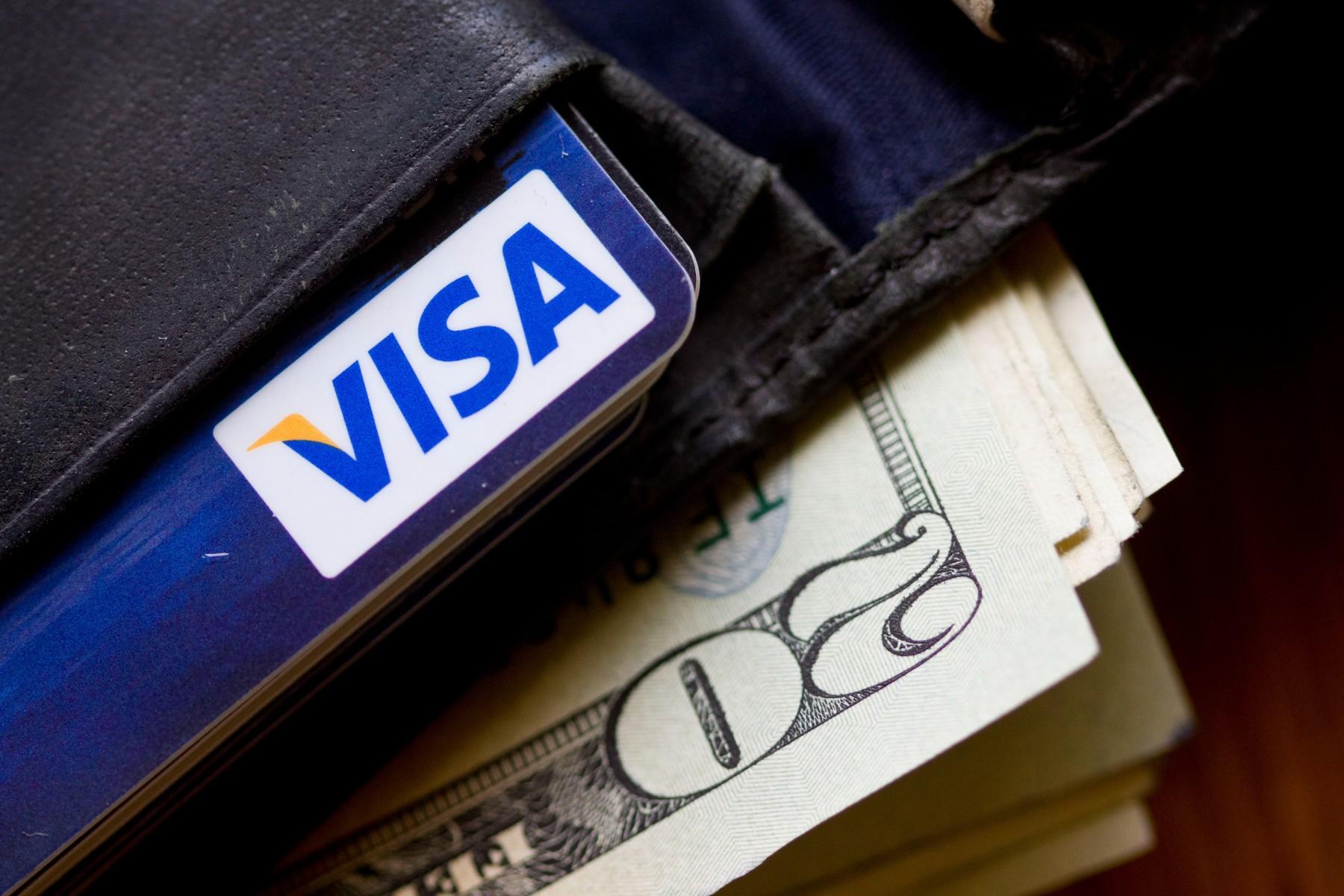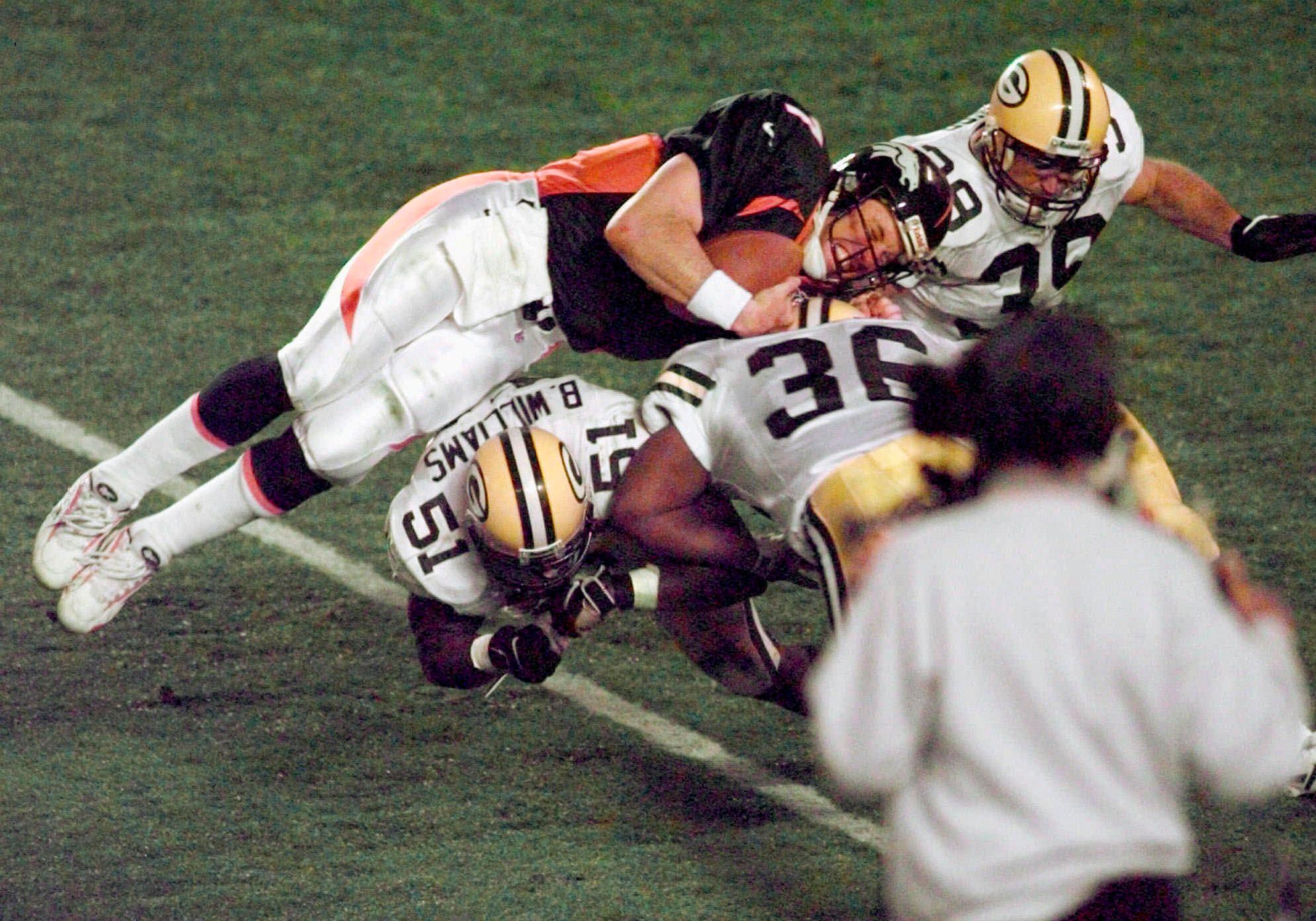
It was a dark and lonely period in Denver and not even Homer Simpson wanted the Broncos.
It was January 1997. John Elway led the Broncos to the best record in the AFC and the number-one seed in the conference playoffs. The team had it all: A veteran, future Hall of Fame quarterback; a fierce, downhill bowling ball of a running back in Terrell Davis; and a coach dubbed “the mastermind,” Mike Shanahan.
Hopes were high. The road to the Super Bowl ran through Mile High Stadium!
What could possibly go wrong?
Insert the sound of a record scratching here.
On the fourth day of January, the Broncos suffered one of the worst defeats in franchise history, losing at home in the divisional round of the playoffs to the Jacksonville Jaguars – an expansion team that was only in its second season of existence.
“I was at the game,” said Broncos fan and Denver native Joe Montoya. “We were in the South Stands. I’ve never seen Mile High Stadium so quiet. You could hear a pin drop. We were so disappointed.”
The loss was yet another example of the Broncos losing a big game. Prior to that playoff loss to Jacksonville, the Broncos had been to four Super Bowls. They lost them all … by a combined score of 163 to 50.
One hundred and sixty three to fifty.
In a nod to the spanking the Broncos received from the San Francisco 49ers in Super Bowl XXIV, one witty vandal spray painted on some signs along Interstate 25: Speed Limit 55. Broncos 10.
The Broncos were a laughing stock. Enter Homer Simpson.
In an episode of “The Simpsons” that clairvoyantly aired just a couple months before Denver’s embarrassing loss to the Jaguars, Springfield’s rich evil genius Hank Scorpio gave the Broncos to Homer as a gift. It was a consolation prize because Homer’s real fantasy was to own the Dallas Cowboys.
“Awwww, the Denver Broncos?!” Homer says dejectedly as Broncos players were throwing around footballs outside the Simpsons’ home.
“I think owning the Broncos is pretty good!” Marge Simpson says, before asking Homer why owning the team is such a bad thing.
Homer sighs. Then he says, “You just don’t understand anything about football, Marge.”
A Wilco song says, “You gotta learn how to die/If you want to be alive.”
The Broncos had died plenty. Would the pain ever stop?
“It sucked, it was terrible,” said Broncos Ring of Fame wide receiver Rod Smith, reflecting on the Jacksonville loss. “I remember literally for a whole week I just sat on the couch, and I don't remember moving. And my son comes up to me, and he’s all like 4 years old at the time. He’s like, ‘Hey dad! Can I go to the next game?’ And I just started laughing because he didn't realize it was over.”
But the Broncos would be back the next year. And this time, they weren’t gonna lose.
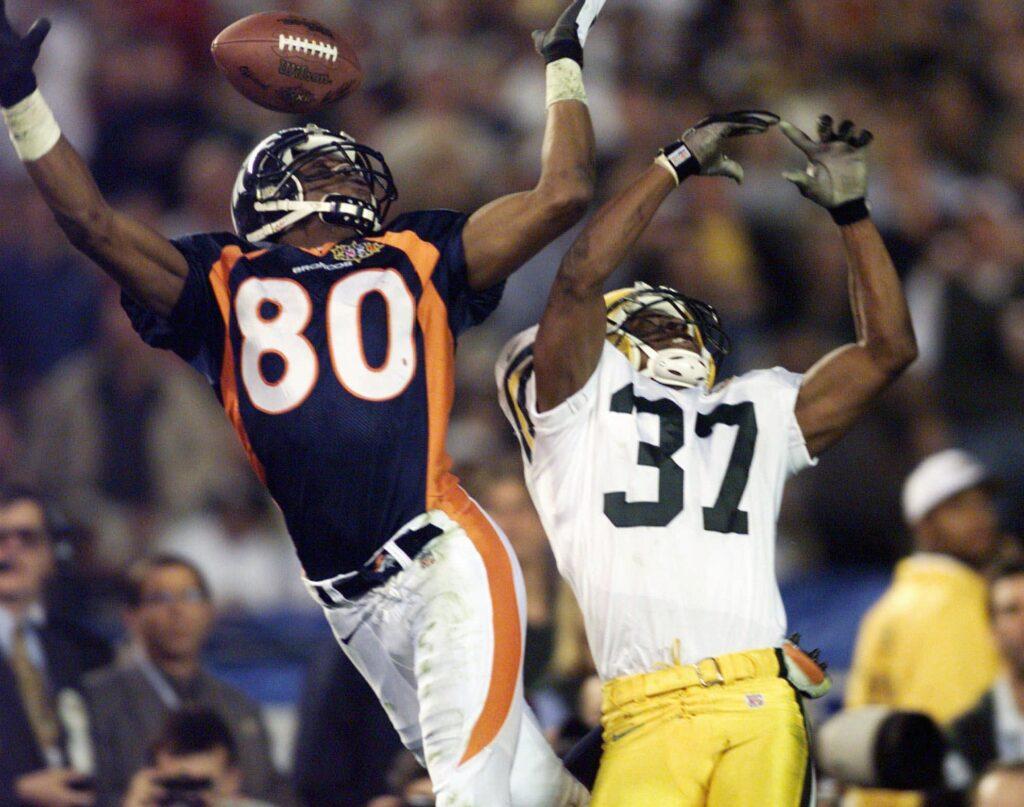
The revenge tour
After that loss to Jacksonville, Broncos owner Pat Bowlen assured coach Mike Shanahan that he would do whatever it took to make the team better. In the offseason, the Broncos added key ingredients to a team that was already good, but needed some help. Players like veteran defensive lineman Neil Smith bolstered Denver’s defense, and fullback Howard Griffith became an unsung hero, clearing lanes for Terrell Davis.
“We didn't really say much during the offseason, we just worked extremely hard to get ourselves back to that position (of playing for a championship),” Rod Smith said. “We added some pieces and found a way to get back.”
And to mark the fresh start, the Broncos said goodbye to their fan-favorite old-school orange and blue uniforms, with the signature bucking Bronco kicking through a big letter “D” on their helmets. The new unis – which are still largely the same style they have today – had a more modern take.
“I remember there were a lot of people upset about the new uniforms, ‘Oh, you gotta go with the classics!’ Rod Smith recalls. “But wearing the classics never won us anything.”
Ultimately, winning a Super Bowl mattered much more to fans than what the team was wearing. And while the team did suffer some setbacks during the 1997-1998 regular season – Broncos linebacker Bill Romanowski infamously spitting in the face of a 49ers player during a Monday Night Football game, for one – the Broncos had another good year, going 12-4.
But even that wasn’t good enough to win the AFC West. And with teams like Kansas City and Pittsburgh – who beat the Broncos in the regular season – having impressive seasons, much of the Broncos’ road to the Super Bowl would run through cities not named Denver.
But the Broncos were OK with that. Besides, Rod Smith says revenge is sweeter on the road.
“We were still fuming from the previous year,” he said. “And the cool thing is we got to go on a revenge tour of all the teams that had beaten us the previous year… And you gotta go on the road and nobody’s there for you, everybody in the world is watching. And we just relished in the moment.”
The playoff revenge tour started in Denver, where the Broncos took all of the anger and frustration they had been carrying for the last year out on the Jaguars in a romp at Mile High. The next week, Denver’s defense shined in a thrilling win in Kansas City against their AFC West archrival. And the impressive run culminated in a victory in Pittsburgh for the AFC Championship.
The good news: The Broncos were going back to the Super Bowl!
The bad news: The Broncos were going back to the Super Bowl.
Glenn Chavez of Denver speaks for a lot of Broncos fans back then:
“I was just like, ‘Please play a good game. Whether you win or lose, just look good. Don't get blown out,’” he said. “It was very frustrating to get the hopes up just to be afraid you're going to be let down badly again.”
You couldn’t blame fans like Chavez for being on edge because reminders of the Broncos’ atrocious Super Bowl history were all over TV and in the newspapers leading up to the game.
“(The Broncos) were a very solid football team,” said legendary Broncos linebacker Tom Jackson, who co-hosted ESPN’s “NFL Prime Time” with Chris Berman, and who covered the Broncos at Super Bowl XXXII. “But the absolute anxiety that was felt by anybody who had been part of that organization of those four previous losses, going up against the defending world champions, everybody felt it. Everybody felt it.”
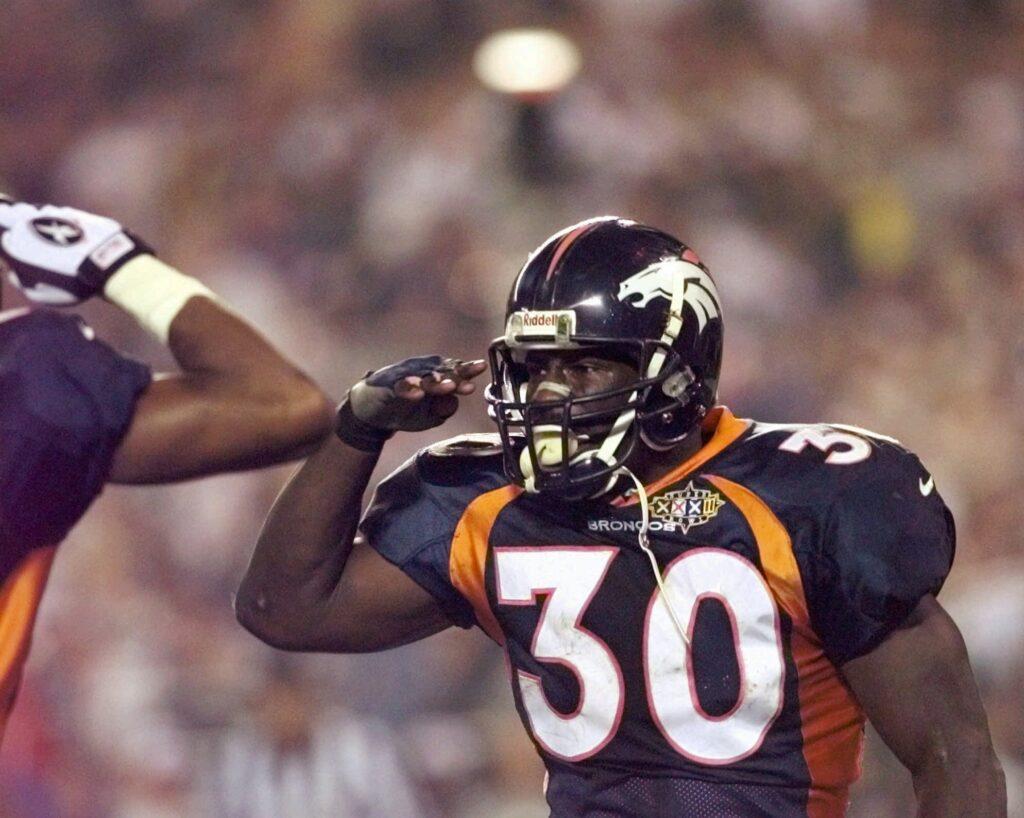
‘This one’s for John’
Brett Favre and the Green Bay Packers were indeed reigning champions and were a mighty tall task for the Broncos, who were 14 point underdogs entering the game in San Diego. On top of that, teams in the AFC had lost 13 straight Super Bowls to their NFC rivals.
But coach Mike Shanahan didn’t care about the odds.
“Before the game, everybody was wondering what Mike Shanahan was gonna say,” Jackson recalled. “The team has lost four Super Bowls, there’s nobody who doesn’t know that, and you’re playing a really outstanding football team and you’re double digit underdogs and everybody knows it.”
You could hear a pin drop in the locker room 10 minutes before the game, Jackson said. The players were all on a knee, locked arm in arm.
“And then coach got up. It was easy to remember because it was the best and the shortest pregame speech I'd ever heard. Mike Shanahan goes, ‘Men, let’s go out and show the world what kind of football team we got’ – And he turned on his heels and he walked out the door.”
That was all the team needed to hear, said Jackson.
“The confidence with which he said it, he lifted everybody off the floor with that.”
Rod Smith said the players’ confidence that day was right up there with Shanahan’s. When asked at what point did he realize that his team was going to win the Super Bowl, Smith said, “When we woke up that morning.”
“You gotta remember what we had already been through; what we had gone through the previous year, what we went through the regular season, then had to go on the road as a wild card team. Playing Green Bay in the Super Bowl was an easy task.”
Terrell Davis certainly made it look easy. Running behind the smallest and most agile offensive line in the NFL that season, Davis ran for 157 yards in the big game and scored a Super Bowl record three rushing touchdowns – despite sitting out for part of the game with a migraine.
“When the Broncos first had the ball and Davis was picking up several yards at a time, Mike Shanahan turns to anybody who cares to listen and goes, ‘If they can’t stop that, they can’t win,’” Smith said. “And I'm like, ‘Oh my God, he said that while we’re down 7-0!’”
Davis would be named Super Bowl MVP.
“TD’s ability to run that ball was what changed the nature of the game,” said Jackson. “And I think the only thing that really kept it close was when he got the migraine.”
Then there’s the helicopter play.
Every Broncos fan who watched Super Bowl XXXII has that moment etched into their minds.
It’s late in the third quarter. The game is tied at 17. It’s third down and six. John Elway takes the snap. He runs. He dives – head first into three Packers defenders.
To quote Dick Enberg, who was calling the game for NBC: Oh My.
“How important is this football game? How bad does John Elway want to win this football game?” said NBC analyst Paul Maguire after Elway’s effort gave Denver a key first down.
Rod Smith was on the field for that down.
“That was our season, man,” he said. “That was his career. When they give you a name, and it’s just one name, when you're just Elway, when you're just Jordan, when you’re just Lebron, when you got that single name, there's always a play in your career that defines it. That run defines his career.”
With seconds left in the game, Denver’s defense stopped Green Bay on fourth down. The game was over.
The Broncos won. They actually won the Super Bowl.
John Elway was in tears as his teammates carried him off the field. John Elway finally won a Super Bowl.
“This one’s for John!” owner Pat Bowlen said as he handed the Lombardi trophy to Elway.
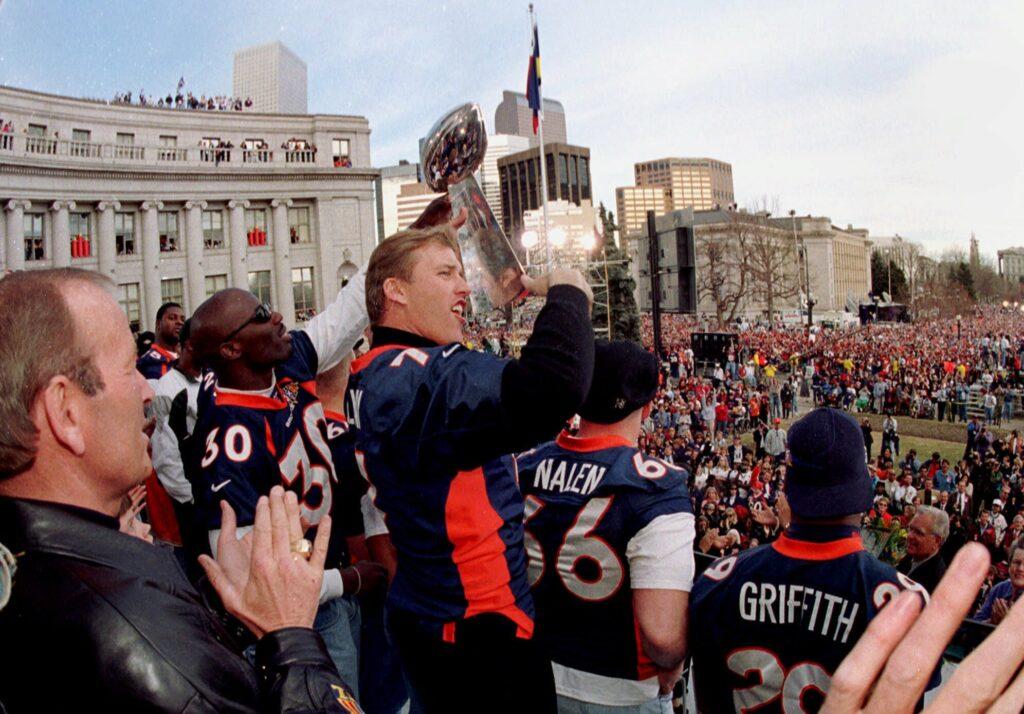
“We were crying,” Montoya said. “Every one of us was crying. I would say three quarters of us that were at the party were natives. And we’ve been through all the ups and downs, all the losing Super Bowls, and most of us were crying. We could not believe it. Unbelievable!”
Rod Smith was trying to call friends back in Denver, but couldn’t get through.
“All the lines were jammed up. There were no phone lines available in the state of Colorado at that time. Like, everybody was on the phone.”
On the phone or in the streets, going nuts. A sea of Orange and Blue covered lower Downtown Denver as tens of thousands of people partied for hours after the Broncos won. Some fans got out of hand. Bonfires were set as some unruly people dangled from utility wires, according to Associated Press reports. Police in riot gear used tear gas on some of the crowds.
But most of the partying that night went off without violence or the need for police intervention.
“When I was driving home, you could just see people on random street corners jumping up and down,” Glenn Chavez said. “And you knew what they were celebrating. There wasn't anyone being silly or destructive, they were jumping and yelling and everybody just felt it. It was wild.”
Tom Jackson went to the Broncos afterparty in San Diego. He remembers Champagne being everywhere. Pat Bowlen was dancing at the front of a conga line.
“All the guys who had played previously with the Broncos organization were thanking (the current team) for doing what they did; thanking those guys for taking that weight off our shoulders,” Jackson said. “They’re never gonna be able to say ever again that the Broncos haven't won the Super Bowl.”
Wellington Webb was Denver mayor at that time. He said neighbors were high-fiving neighbors they had never met before. He attended a mayor’s conference the next day wearing a Broncos lapel pin.
“No one was making fun of Denver anymore,” Webb said.

